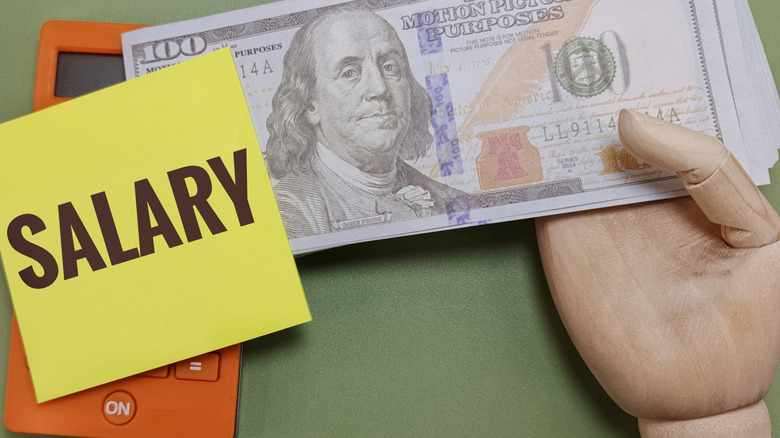13 Telling Signs That Mean You're Officially 'Upper Class'
Finding your way into what most call "the upper class" remains a financial goal for millions of Americans. Upper-class lifestyles are the subject of escapist reality television and fantastical series alike. We're inundated with visions of what this life is like, from the luxury homes and cars to upgraded wardrobes, expensive hobbies, and elegant food and beverage selections. There are a number of habits that the world's wealthiest people all have in common, and it might be surprising to learn that frugality is among them. Considering all the flashy hallmarks of pop culture's window into the upper class, it's perhaps hard to fathom that people who actually occupy this part of society frequently show a marked level of spending restraint. Although, digging a little deeper, it becomes clear that spending money frivolously is almost certainly the easiest way to find yourself falling out of the upper class.
Beyond financial habits that help people stay among the wealthy, there are actually a range of signs that can point to a person's inclusion in this financial category. It's worth pausing to note that an upper-class financial status has nothing to do with someone's socialization skills or moral compass, and becoming a part of the upper class doesn't suddenly make you a better or even different person. Even so, building wealth over the long term is a goal held by nearly everyone, with the ultimate destination as a place among this category of enriched companions. If you're on your journey toward this lifestyle, here are some of the main signs to look out for to know you've made it.
Your household salary provides enough mobility for quick growth
To understand the "upper class" you first have to think about wealth. For most people in this world, wealth is generated by trading time for money. You go to work everyday and spend it engaged in tasks that your employer then compensates you for. No matter what kind of work you do, you do it for a salary. Those who find themselves among the ultra-wealthy frequently have a different relationship with their work schedule, and some may not work at all. The vast majority of Americans making their way through this life go to work every day in order to support themselves financially, though. Both low income earners and corporate CEOs who rake in millions (or even hundreds of millions) annually clock in through roughly the same avenue.
With this in mind, starting with your salary can help frame the crossover from middle class to upper class. To be a part of this upper echelon of financial society you'll need to have more money than most people. As a starting point, this means earning a higher salary. An upper class salary starts at an average household income figure of $169,800. Depending on where you live in the country, this may be higher or it could be reduced. For instance, in California the typical upper class household income rests at about $200,000. Of course, there's a lot more to discuss than just the number printed on your paycheck.
You supplement your salary with passive income streams
One thing that higher earners frequently have in common is a diversification of their income sources. Those in the lower and middle class frequently go to work and come home, filling out their taxes with a single W-2 each year. Those in the upper class know the value of portfolio diversification and will often dabble in opportunities to drive extra sources of income. There are lots of side hustles and gig-work opportunities that people can take advantage of to boost their earnings, but these resources require the same time input that your primary job demands. There's only so many hours in the day, and working two or more jobs on a regular basis can quickly lead to burnout. Instead of stretching themselves thin, upper class members build additional, passive income streams that provide a means of earning money without having to commit valuable time to the process.
Of course, no income source is completely passive. There will always be some requirement, either up front legwork or commitment to management throughout. For instance, investing in real estate can be a solid passive income driver. But you'll need to save money to create enough capital for a down payment and then engage in the work of managing the property. Another option is writing a book. This requires a huge amount of upfront work, but once it exists it will continue to be out there in the market for as long as you desire.
You own your own home
Owning your own home is often a non-negotiable feature of joining the middle- and upper-class designations. Whether it's an apartment in the city or a sprawling rural estate (or even a humble starter home that you'll hope to one day move out of for greener pastures) buying into the property market is critical. Of course, owning your own home comes with its own challenges and potential setbacks. Becoming a homeowner means you can no longer rely on someone else to fix a burst pipe or replace a broken dryer at a moment's notice.
But ownership also brings plenty of financial benefits that can't be found as a renter. For one thing, property enjoys an annualized increase over the last decade of roughly 6% to 10%. This means that every year you own your home it tends to increase in value by a not-so-subtle amount. Leveraging it in the future to buy something new with secured lending products is in the cards, as is downsizing in order to extract a large bulk of cash to support some specific need. No matter what kind of home you own, becoming a property owner supercharges your net worth for the long term.
Your home is in a 'great neighborhood'
Homeownership exists on a spectrum. Buying into the property market gives you a financial leg up, but those in the upper class don't just buy property that suits a budget alone. Premium properties are one hallmark of the upper class, and those who find themselves in this expensive company frequently pride themselves on the neighborhood that they call home. Premium real estate comes in many forms. Some extravagant homes feature upgraded amenities throughout the construction. Others can be found in neighborhoods adjacent to excellent schools in the area.
The neighborhood a home is located in does a lot of the heavy lifting when it comes to valuing properties that would otherwise be similar in their size, layout, or other specifics. If you have bought a home in a neighborhood that might be considered good, great, or even elite, there's a high likelihood you fit within the context of the upper class.
You've probably earned one or more collegiate degrees
Higher salaries tend to follow higher educational attainment. Those with a bachelors degree can expect to earn roughly $30,000 more than high school diploma holders annually, and a similar jump can be seen in average salaries with masters educated individuals. PhD holders naturally enjoy the highest average figures of the bunch, at weekly average earnings figures of $2,083 compared to a high school educated earner's $853 (via BLS).
Of course, there are plenty of blue collar jobs that pay very high salaries, and there's the obvious billionaire examples of college dropouts who went on to form their own companies and strike it rich. But generally speaking, these examples are outliers and don't follow the typical trend that you should expect unless you have the next great idea bouncing around in your head or have developed a plan to enter into the trades and put in the work to earn the big bucks. On the whole, the higher your educational attainment level is the more you can expect to see in your paychecks. However, with greater time spent in the classroom you may also experience a higher debt load that can set your finances back in other ways, too.
You don't carry revolving credit card balances
On subject of debt, 60% of Americans carry revolving balances from one month to the next on their credit card accounts. Those in the upper class may use credit cards on a regular basis or not, but they generally won't maintain balances that follow them from one pay period to the next.
If you want to become a member of this elite financial club, you'll need to tackle your credit card debt. Carrying over balances from month to month costs you far more than you might expect. The average credit card today carries an interest rate of 25.37%. There's just no way to counterbalance this incredibly negative weight with reliable investments. By carrying balances on your credit card accounts, you are hanging an anchor around your neck that will continue to drag your financial mobility down until you take them seriously and eliminate them. By clearing away credit card balances, you give yourself the maximum amount of discretionary spending power available. Everyone has financial obligations, but crossing credit card bills off that list is a tremendously empowering change of pace.
You do leverage assets when making big financial decisions, though
Responsible credit card usage is important for all Americans, but those in the upper echelons of financial society tend to rely on a different kind of financing to manage their buying power. Instead of pulling out a credit card, the rich leverage their existing assets to borrow money. This may be a luxury home or a vast war chest of stock market assets. For the ultra-wealthy, stock holdings provide something of a cheat code, in particular.
Instead of selling stocks in order to gain access to the underlying capital, borrowing against their value provides numerous benefits. Selling would incur a capital gains tax assessment. For those earning high end salaries, this means adding a reduction to the sale value of around 20%. Instead, borrowing against these assets gives them the cash they need at a lower cost and then they can write off the interest, reducing their tax burden in the process. All this happens without selling the commodity itself, keeping its value intact and allowing it to continue growing.
You invest in a broad portfolio of assets
Investments are a place where high-net-worth individuals differentiate themselves from the rest of the pack. Those with significant resources have the ability to invest in a wider array of opportunities. Those in the upper class might invest in real estate properties, commodities like fine art, or even extremely collectible baseball cards. They may even buy into businesses in their local area to diversify further. Lower income individuals tend to stick to the stock market and they might buy bonds or venture into gold bullion when particularly rattled by negative stock market movements.
Investing in a broad portfolio is a hedge play that high earners can afford. Those in lower income brackets often feel the pressure to pump as much capital as they can into the things that are performing well in the moment. There's a kind of fear of missing out that takes place here. By not getting in with as much weight as possible now, you might kick yourself thinking you could have invested more before the asset takes off in value down the road. But an overextension like this can see your portfolio plummet when things inevitably take a turn. You don't have to be a part of the upper class to diversify your stock market portfolio, but it is a tactic that these individuals understand with greater nuance and utilize with an even broader brush stroke, whether within a single asset class or across investment options.
Your portfolio shows a significant focus on long-term appreciation rather than short-term movers
In addition to intelligent diversification, those in the upper class frequently understand the value of long-term thinking with a more concrete grasp. It's entirely possible to work hard, save diligently, and break into the upper class. But for the most part wealth follows wealth. Those who have it today received it from their parents yesterday and will pass it on to their own children tomorrow. Those who have a firm grasp of maintaining and growing wealth frequently find themselves capable of expanding upon the financial gift they have been given in order to pass on an even greater endowment in the future. This is accomplished by embracing your greatest ally in the stock market or in any other investment opportunity. Time and the compounded interest that it generates works far harder than any active savings strategy you'll deploy on your own.
If you have invested with a focus on the long-term horizon rather than chasing after short-term movements, you are exhibiting a classic strategy of the upper class. These individuals understand that their wealth is built in large part on this waiting game and the value the time brings to their assets. They're in no hurry to spend their money, and you'll want to adopt this kind of mentality in order to break through as well.
You don't experience major financial stress
Financial stress is something that can visit anyone. This is because financial stress is built largely upon the way you leverage your assets rather than the volume of capital you have under your control. Spend extravagantly and increased instability can easily follow. Overextending yourself with your credit card or buying a home that is too expensive for your monthly cash flow can put you in dire straits, regardless of whether you make $10,000 a year or $10 million.
Those in the upper class understand that financial vulnerability is built off of your own actions rather than acting as some sort of monetary value threshold. Anyone can experience this stress if they engaging in reckless spending. Recklessness takes a different form for those earnings high salary, but the result is the same. Because joining the upper class isn't just about how much money you earn, it's important to note that maintaining financial stability is perhaps the most important aspect of entry into this elite wealth status.
You have more free time than most others
The wealthier you become the more work your money does for you. A saver who aggressively invests in their future will find that with each passing year, they actually can begin to scale back the principal investment they make in order to keep pace with their growth targets. The reality is that the wealthier you become the less you actually have to commit your own time working to maintain it. Those who are part of the upper class frequently find that they have more free time to spend with loved ones or to engage in hobbies they have set for themselves.
A member of the upper class might feel that they can easily dip away to play golf with friends or pick up their child from school and head off for a lunch date without worrying about potential negative implications to their finances. An example of this slow transition into additional free time might be seen among aggressive retirement savers who seek to replace their income with dividend producers, often many years before they actually reach retirement age.
You can afford high-end luxuries and don't shrink away when given the choice
Members of the upper class frequently find that they spend a larger portion of their money on high-end luxuries than others. There's obviously status symbols that come with this territory. Upper-class individuals frequently drive high-end sports cars or luxury SUVs. They live in elegant houses, they might be more inclined to splurge on an expensive bottle of wine or an opulent cut of steak when they go out for a meal, for example.
In principle, we all have the opportunity to leverage our money on a variety of cheap options and expensive alternatives. Someone living on a middle-class income might choose to expand their budget when shopping for a new car and shrink other aspects of it to make ends meet. On the other hand, someone with an average salary might be an avid whiskey connoisseur, driving an inexpensive car and opting to spend as much of their disposable income on high end bottles as they can. Upper class individuals frequently look for bargains wherever they are available, but they also know that they can afford a greater array of high end luxuries when they want them. When given the choice to spend their money on something that will enrich their experience in a way they will appreciate, they often do.
You start saving for your children when they are born (or maybe even earlier)
Planning for your children's financial wellbeing is something that every parent typically engages in. Saving for the future when it comes to your children means investing in things like a 529 plan or putting money aside to help buy their first home when they are ready to move out. Those in the upper class understand these priorities and act on them with far greater authority. In the same way that starting your journey of saving for retirement at 18 will deliver vastly more spending power in your golden years than starting at 30 provides, giving yourself the roughly two decades between your child's birth and their exit from the nest is a powerful thing.
Members of the upper class utilize the power of time to their advantage in many ways, and one of them is in their savings strategies aimed at setting their children up for future financial stability. Many will start saving when their children are born, and some might even look to set up savings accounts or investment opportunities before their young one even arrives.













